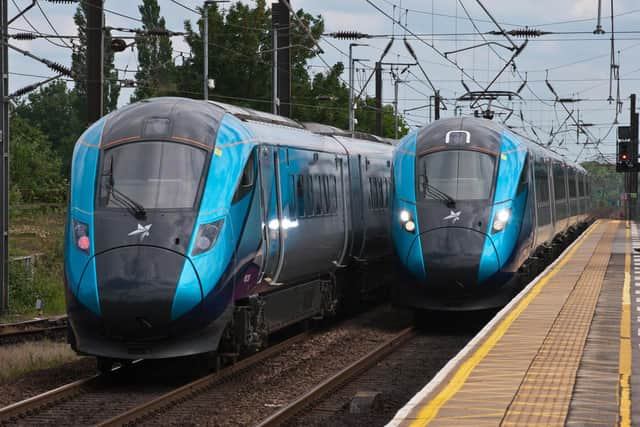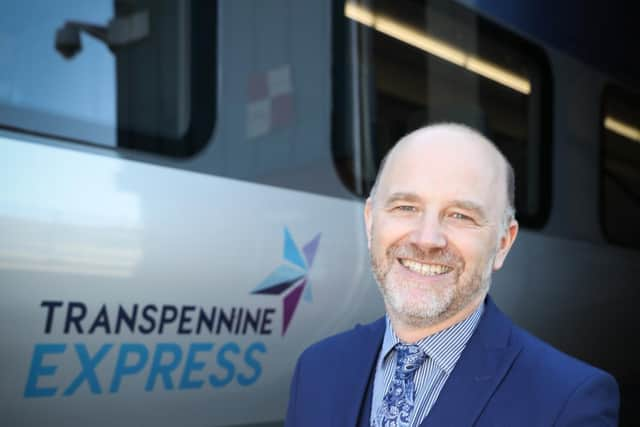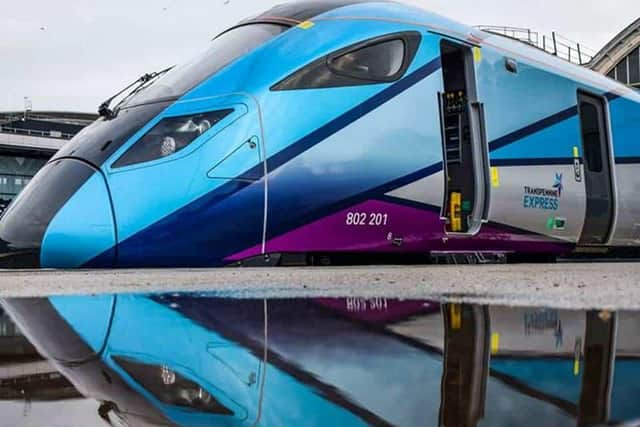Faster, more frequent and more reliable rail travel on the way says new TransPennine Express boss
and live on Freeview channel 276
Matthew Golton joined TransPennine in June from the Great Western Railway where he was interim MD and commercial development director.
In his first interview since becoming managing director, he said that the benefits he saw of a fully electrified network in the South West during this time gave him confidence of what could be achieved in Yorkshire and the North via the TransPennine Route Upgrade.
Advertisement
Hide AdAdvertisement
Hide AdThe scheme will see the core railway between Manchester and York become fully electrified, with more capacity to be put into the system and for 10 stations to receive major upgrades.


More capacity will be put into the system overall and 10 stations are set to get major upgrades or be physically moved.
Mr Golton said that new digital signalling will help with reliability of railways and that there would be a progressive introduction of electric trains on the Pennines, with the rail boss hopeful of procuring so-called bimode trains which can run from either electrical or onboard diesel engine power, helping to further reduce the organisation’s carbon footprint.
Mr Golton said: “Customers at the end of the day will see a railway which is faster in terms of journey times.
Advertisement
Hide AdAdvertisement
Hide Ad“It will be more reliable, [there will be] a frequency change if we get the new equipment and, I think for stakeholders and customers when they are making decisions, it will be a railway that is much more friendly in terms of its environmental impact.”


The electrification of railways across the North has been a source of contention after numerous promises from various Governments to do so.
And while Mr Golton conceded there have been false dawns on the matter, he added: “It is important from the point of view of the virility of the North that the railway plays its part.
“That is what is going to attract people to live and work here.
Advertisement
Hide AdAdvertisement
Hide Ad“There is an imaging point of being able to get from A to B quickly and I absolutely concede that some of the A to B timings in the North of England are just not where they need to be for a modern economy. That is what we need to change.”


Mr Golton added that Britain can learn a great deal from Europe when it comes to the benefits that a high speed rail network brings to the economy.
He said that France was already scrapping its first TGV trains in favour of upgraded stock and that competition amidst the French regions was fierce to be included on the network, such was the positive impact that rapid rail connectivity brought to the continent.
In his first interview since taking up the managing director’s position in June of this year, Mr Golton said he expected the multi-billion pound TransPennine Route Upgrade (TRU) project, which got underway this year, would transform inward investment into the North and added that he hoped to complete elements of the eight-year project ahead of schedule.
Advertisement
Hide AdAdvertisement
Hide AdHe added that passenger numbers on TransPennine’s services currently lay at around two thirds of pre-pandemic levels and that leisure travel was the primary driver of this recovery.
Mr Golton was speaking as speculation mounts that the eastern leg of HS2 to Yorkshire will not be undertaken, prompting fears that Yorkshire will be cut off from the growth benefits facilitated by the project.
“We are at a point with the French network where they are already scrapping the first of their TGVs,” he said.
“And certainly what I have observed in France is that there is a very keen competition around cities and regions to be on that high speed network.
Advertisement
Hide AdAdvertisement
Hide Ad“I think the UK has got a lot to learn from that experience in continental Europe in terms of what it means for regions.”
He added: “Equally, I get it is difficult for any Government, with the challenges coming of the pandemic, to afford everything.
“But I have seen elsewhere the value of a vibrant high speed network. I personally hope that it reaches as many parts as it can.”
Mr Golton spent the first two months in his new post, in his words, “visiting every manned location” in a bid to “get a sense of the business”.
Advertisement
Hide AdAdvertisement
Hide AdHe joins at an interesting time. Passenger numbers are currently about two thirds of that in early 2020 but he said that certain routes on days of the week over the summer were north of where they were pre-pandemic and that leisure was the primary driver of the recovery, but business travel is two thirds of what it was before.
“There is scope for the leisure business to be larger than it was before and I think the evidence of what we have seen this summer would suggest that.
“One of the things that the railway has learnt from the pandemic is that customers are our lifeblood. If they are not here what is the purpose of the railway?”
Comment Guidelines
National World encourages reader discussion on our stories. User feedback, insights and back-and-forth exchanges add a rich layer of context to reporting. Please review our Community Guidelines before commenting.